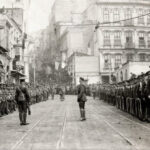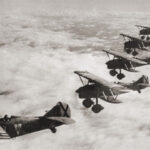What did Wehrmacht soldiers feel in late 1944 and early 1945, knowing the war was lost? How did they keep going despite it all?
What did Wehrmacht soldiers feel in late 1944 and early 1945, knowing the war was lost? How did they keep going despite it all? By late 1944 and early 1945, many Wehrmacht soldiers realized that the war was effectively lost. Several factors influenced their emotions and motivations during this period:
Realization of Defeat
By late 1944, after the Allied landings in Normandy and the Soviet advance into Eastern Europe, it became clear to many German soldiers that victory was impossible. Soldiers witnessed the destruction of major cities, the loss of strategic territories, and a severe decline in supplies and reinforcements. There was a growing sense of doom, especially as the Allied air raids intensified and morale dropped.
Feelings:
Despair: The collapse of the front lines and retreat after retreat shattered many soldiers’ morale.
Fear: Fear of retribution from the Allies, particularly the advancing Soviet forces, was intense. German propaganda had emphasized Soviet brutality, which led to dread among Wehrmacht soldiers, especially those on the Eastern Front.
Survival Instinct
Many soldiers kept fighting out of sheer survival instinct. Retreating or surrendering wasn’t always a viable option, particularly against the Soviets, who were seen as vengeful and brutal. The German army had strict policies against desertion, and many soldiers feared the consequences of disobedience more than battle itself.
Feelings:
Fear of Punishment: The Nazi regime remained oppressive until the end, with brutal punishment for desertion or failure. The SS and Gestapo monitored the military closely, executing deserters or anyone perceived as undermining the war effort.
Sense of Duty: Even in the face of hopelessness, many soldiers believed they had to fulfill their duty, whether out of loyalty to comrades, a sense of honor, or a belief in fighting for the Fatherland.
Comradeship and Group Loyalty
Despite knowing the war was lost, soldiers often continued fighting out of loyalty to their fellow soldiers. The sense of brotherhood in the trenches, and the shared hardships, kept many Wehrmacht soldiers motivated. The bonds formed in combat were sometimes stronger than ideological commitment or belief in the Nazi cause.
Feelings:
Camaraderie: Soldiers felt a strong sense of solidarity with their comrades, and they did not want to abandon their brothers in arms, even in the face of overwhelming odds.
Guilt and Responsibility: Some soldiers felt guilty for leaving their comrades behind or believed that surrendering would dishonor the sacrifices made by others.
Propaganda and Indoctrination
Nazi propaganda, although waning in effectiveness, still played a role in keeping some soldiers committed. Messages about defending the Reich from the “Bolshevik menace” and the “Jewish conspiracy” were deeply ingrained in the minds of many Wehrmacht troops. The Nazis emphasized the idea that the war was a fight for Germany’s survival, and surrendering would lead to the total destruction of the German people.
Feelings:
Stubborn Resistance: Some soldiers clung to the hope of a miracle or believed in Nazi promises of “wonder weapons” that would turn the tide of the war.
Ideological Commitment: Particularly among younger soldiers or those deeply indoctrinated by the Nazi regime, there was still a belief that they were fighting for the survival of their nation and race.
Uncertainty and Pragmatism
In some cases, soldiers simply did not know what else to do. The army structure still existed, and orders were still given. Even as the war was being lost, soldiers continued to follow commands because of routine and the military discipline instilled in them.
Feelings:
Numbness: Many soldiers were emotionally numb by this stage in the war, after years of hardship and death.
Apathy: Some simply went through the motions of fighting, waiting for the inevitable end.
The Final Battles and the Führer’s Orders
Adolf Hitler and high command continued to issue orders to fight to the last man, especially during the Battle of the Bulge and the final defense of Berlin. Many soldiers, particularly the older generation, still held a residual respect for the Führer, and obeying his commands was a matter of duty.
Feelings:
Fatalism: Some soldiers accepted that they would die in the war, resigning themselves to the inevitability of death or capture.
Stubborn Defiance: For others, especially hardline Nazis or soldiers fighting under fanatical officers, the idea of fighting to the bitter end was seen as a form of defiance or martyrdom for the German cause.
Conclusion
In summary, Wehrmacht soldiers in late 1944 and early 1945 were driven by a mix of fear, duty, comradeship, indoctrination, and survival instinct. While many knew the war was lost, the forces of punishment, fear of capture, loyalty to comrades, and ingrained obedience kept them fighting even in the face of inevitable defeat.


